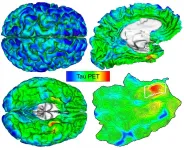(Press-News.org) PROVIDENCE, R.I. [Brown University] -- Studies have shown that nearly half of all medical students in the U.S. report symptoms of burnout, a long-term reaction to stress characterized by emotional exhaustion, cynicism and feelings of decreased personal accomplishment. Beyond the personal toll, the implications for aspiring and practicing physicians can be severe, from reduced quality of care to increased risk of patient safety incidents.
According to a new study published on Tuesday, Feb. 2, in JAMA Network Open, students who identify as lesbian, gay or bisexual (LGB) are more likely than their heterosexual peers to experience burnout.
"The health and well-being of trainees is intimately linked to the quality of patient care, physician retention, and is key to reducing care inequities," said lead author Dr. Elizabeth Samuels, an assistant professor of emergency medicine at the Warren Alpert Medical School of Brown University. "Understanding how the current medical training environment impacts lesbian, gay and bisexual medical students is critical for improving their training experience, building and retaining a workforce of LGB physicians, and also delivering optimal care to all patients -- especially those who also identify as LGBTQI+."
Samuels, who is a practicing emergency physician at Rhode Island Hospital and The Miriam Hospital, has focused previous research on equity and diversity in the health care workforce and the care of transgender and gender non-conforming people. Data from Association of American Medical Colleges' annual survey of graduating medical school served as the basis for the new study.
"The impetus for this study came out of my own personal experiences as a medical trainee and as a mentor to medical students, as well as a person dedicated to addressing health inequities and improving care for LBGTQI+ patients," Samuels said. "When my collaborators and I learned that the AAMC had added questions about sexual orientation to their annual graduating medical student survey, we thought it would be a good opportunity to examine the experiences of LGB trainees generally, and more specifically, to examine whether medical student experiences of mistreatment and burnout varied by sexual orientation."
The study, conducted in collaboration with researchers from Yale University, is based on data from the 2016 and 2017 AAMC Medical School Graduation Questionnaire, a national survey that includes questions on everything from medical education to financial costs to clinical experiences. In the survey are questions about negative experiences (mistreatment, burnout) and identity, including sexual orientation. Response options include "heterosexual or straight," "gay or lesbian" and "bisexual." The study combined the former into the category of LGB. Information about the gender identity of students who identify as transgender or genderqueer was not provided to the researchers for analysis.
In the study's analysis of 26,123 total responses, 17% of LGB medical students reported high levels of burnout compared to 11.1% of heterosexual students.
Potential causes of burnout include the intensity of medical training, strained finances and unattainable expectations, the authors note in the study. Mistreatment is also a contributing factor, and there has been increased interest in examining its effects on trainees from racial and ethnic groups underrepresented in medicine. However, research has yet to focus specifically on LGB medical students.
"This is the first work that really looks at the relationship between sexual orientation and burnout and how that is mediated by mistreatment," Samuels said.
In the study, LGB students also reported a higher frequency of perceived mistreatment. For example, 27% of LGB students reported being publicly humiliated, compared with 20.7% of heterosexual students; 23.3% reported perceived mistreatment specific to their sexual orientation at least once during medical school, compared with 1% of heterosexual students.
Samuels notes that mistreatment didn't completely explain the emotional strain experienced by LGB medical students, who were 30% more likely to experience burnout even after adjusting for reported experiences of mistreatment.
The researchers found that LGB students reporting frequent experiences of mistreatment related to their sexual orientation had an 8 times higher likelihood of burnout compared to heterosexual students. This difference was dramatic when mistreatment occurred more frequently, Samuels said. But at lower levels of mistreatment, the differences weren't as extreme.
"I think this shows people's resiliency -- up to a point," Samuels said.
Samuels asserts that there are characteristics of medical training, separate from individual experiences of mistreatment, that leads to increased burnout among LGB trainees. After all, previous studies have shown that a high of LGB medical students report concealing their sexual identity during medical school for fear of discrimination. They also report more depression, anxiety, and low self-rated health compared with heterosexual students.
"Layering concerns about homophobia and discrimination on top of the general intensity of medical training can lead not just to burnout, but also to truly deleterious mental health effects," Samuels said.
This can have far-reaching consequences, she noted, as the well-being of the health care workforce is strongly linked to the kind of care that providers are able to offer patients. These findings, she said, underscore the need for continued, comprehensive support and mentorship for LGBTQ medical students, and the importance of institutional culture change to create healthy, diverse, inclusive medical school learning environments.
"Not only is that helpful for individual trainees, but building this workforce is a key strategy in addressing health inequities experienced by LGBTQI+ communities everywhere," Samuels said. "This study gives us a sense of where we are now, and how far we still need to go."
INFORMATION:
The study was conducted in cooperation with the Association of American Medical Colleges. It was funded by a Society for Academic Emergency Medicine Academy for Diversity and Inclusion Research Grant and the Northeast Group on Educational Affairs Research Grant Program.
Period poverty, a lack of access to menstrual hygiene products, and other unmet menstrual health needs can have far-reaching consequences for women and girls in the United States and globally.
New research led by George Mason University's College of Health and Human Services found that more than 14% of college women experienced period poverty in the past year, and 10% experienced period poverty every month. Women who experienced period poverty every month (68%) or in the past year (61.2%) were more likely to experience moderate or severe depression than those who did not experience period poverty (43%).
Dr. Jhumka Gupta, an associate professor at George Mason University was senior author of the study published in BMC Women's Health. ...
MINNEAPOLIS- February 2, 2021 - In Minnesota, there are currently about END ...
BOSTON - Amyloid-beta and tau are the two key abnormal protein deposits that accumulate in the brain during the development of Alzheimer's disease, and detecting their buildup at an early stage may allow clinicians to intervene before the condition has a chance to take hold. A team led by investigators at Massachusetts General Hospital (MGH) has now developed an automated method that can identify and track the development of harmful tau deposits in a patient's brain. The research, which is published in END ...
Nearly 11 percent of people admitted to an intensive care unit in Sweden between 2010 and 2018 received opioid prescriptions on a regular basis for at least six months and up to two years after discharge. That is according to a study by researchers at Karolinska Institutet published in Critical Care Medicine. The findings suggest some may become chronic opioid users despite a lack of evidence of the drugs' long-term effectiveness and risks linked to increased mortality.
"We know that the sharp rise in opioid prescriptions in the U.S. has contributed to a deadly opioid crisis there," says first author Erik von Oelreich, PhD student in the Department of Physiology and ...
A decision-support tool that could be accessed via mobile devices may help clinicians in lower-resource settings avoid unnecessary antibiotic prescriptions for children with diarrhoea, a study published today in eLife shows.
The preliminary findings suggest that incorporating real-time environmental, epidemiologic, and clinical data into an easy-to-access, electronic tool could help clinicians appropriately treat children with diarrhoea even when testing is not available. This could help avoid the overuse of antibiotics, which contributes to the emergence of drug-resistant bacteria.
"Diarrhoea is a common condition among children ...
FRANKFURT. Chronic liver disease and even cirrhosis can go unnoticed for a long time because many patients have no symptoms: the liver suffers silently. When the body is no longer able to compensate for the liver's declining performance, the condition deteriorates dramatically in a very short time: tissue fluid collects in the abdomen (ascites), internal bleeding occurs in the oesophagus and elsewhere, and the brain is at risk of being poisoned by metabolic products. This acute decompensation of liver cirrhosis can develop into acute-on-chronic liver failure with inflammatory reactions throughout the body and failure of several organs.
In the PREDICT study, led ...
BLOOMINGTON, Ind. - In Lily Tomlin's classic SNL comedy sketch, her telephone operator "Ernestine" famously delivers the punchline, "We don't care. We don't have to. We're the Phone Company." But new research finds that satisfied customers mean increased profits even for public utilities that don't face competition.
Little is known about effect of customer satisfaction at utilities. As a result, utility managers are often unsure how much to invest in customer service - if anything at all. The issue also is of interest to regulators responsible for protecting consumers.
The study, in ...
CORVALLIS, Ore. - One of birdwatching's most commonly held and colorfully named beliefs, the Patagonia Picnic Table Effect, is more a fun myth than a true phenomenon, Oregon State University research suggests.
Owing its moniker to an Arizona rest area, the Patagonia Picnic Table Effect, often shortened to PPTE, has for decades been cited as a key driver of behavior, and rare-species-finding success, among participants in the multibillion-dollar recreational birding business - an industry that has gotten even stronger during a pandemic that's shut down so many other activities.
But a study led by an OSU College of Science ...
Scientists and engineers at the University of Sydney and Microsoft Corporation have opened the next chapter in quantum technology with the invention of a single chip that can generate control signals for thousands of qubits, the building blocks of quantum computers.
"To realise the potential of quantum computing, machines will need to operate thousands if not millions of qubits," said Professor David Reilly, a designer of the chip who holds a joint position with Microsoft and the University of Sydney.
"The world's biggest quantum computers currently operate with just 50 or so qubits," he said. "This small scale is partly because of limits to the physical architecture that control the qubits."
"Our ...
New research from the Okinawa Institute of Science and Technology Graduate University (OIST) has found a surprising randomness for how fluids choose their path around obstacles that depends on their spacing. This has important implications for a range of scenarios - from oil recovery and groundwater remediation, to understanding the movement of fluids through biological systems. The research was published in Physical Review Letters.
Scientists from OIST's Micro/Bio/Nanofluidics Unit created a tiny set up comprised of two microscopic cylinders, each around the width of a human hair, placed side-by-side in a channel. This created a choice of three possible paths for a fluid to take past the pair of obstacles. A viscoelastic fluid, which is like that ...




